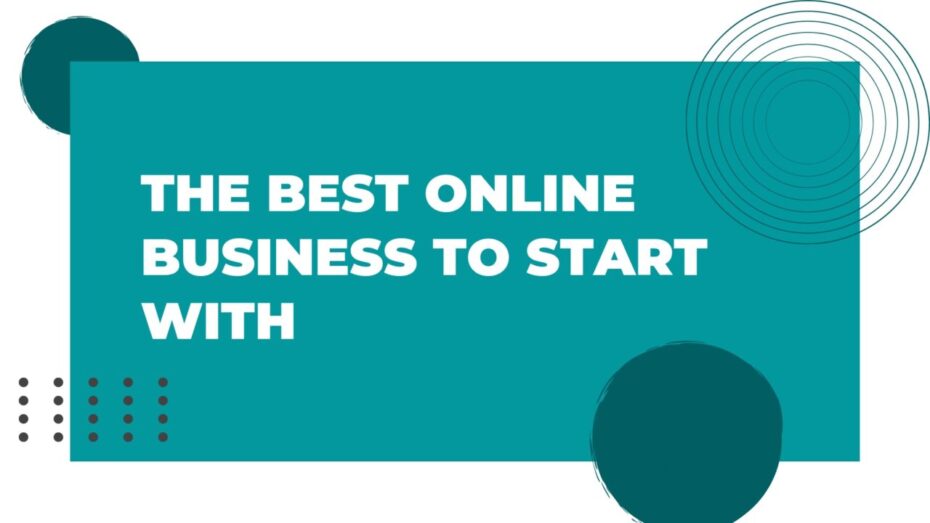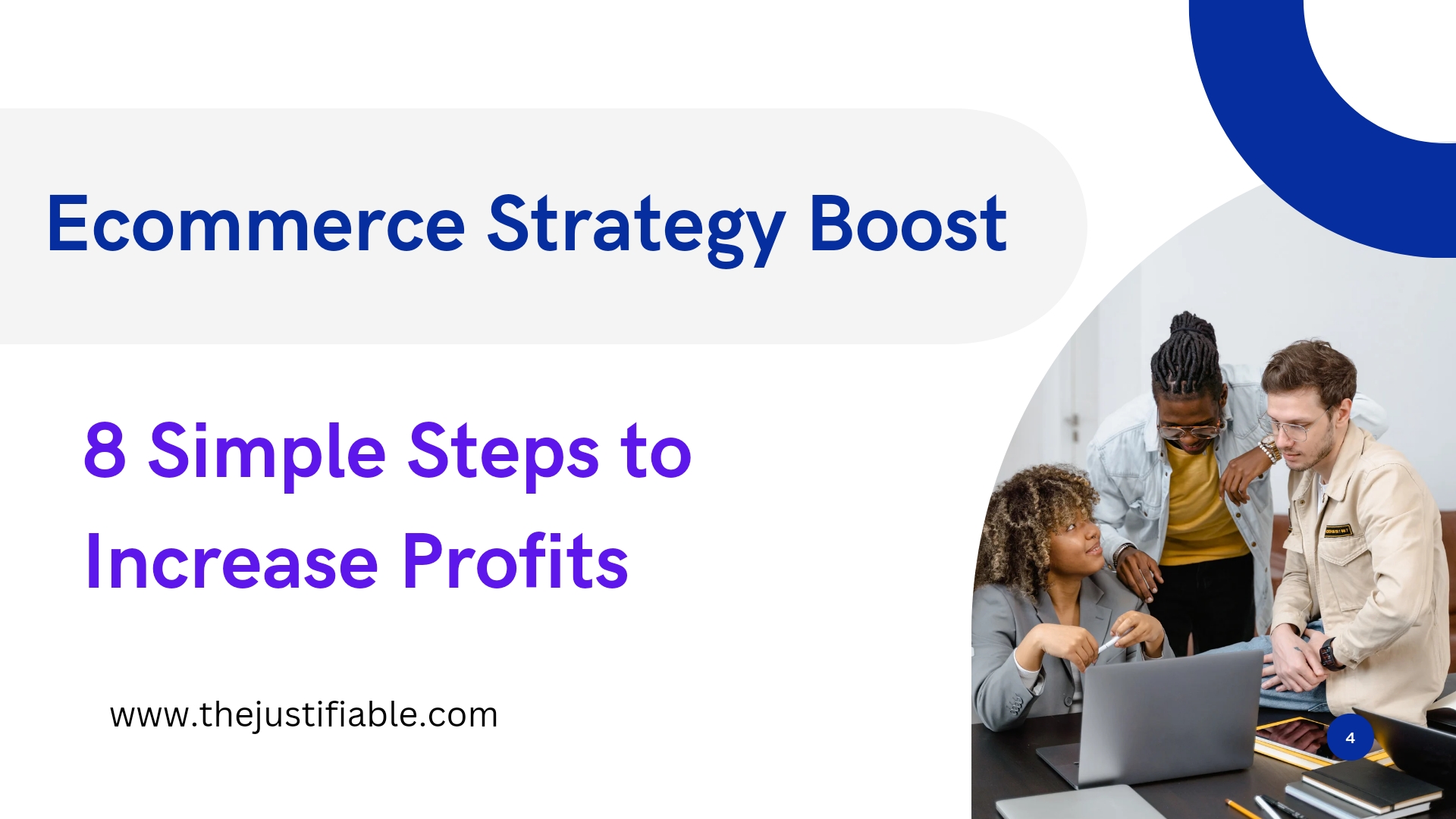Table of Contents
Are you wondering what the best online business to start with is? Which one will give you the quickest return on investment? How do you know which business model suits your skills and interests?
In this article, we’ll dive into the most promising online business ideas, offering insights into their potential and guiding you on the path to success.
Top Profitable Online Businesses for Beginners
If you’re just starting, it’s essential to choose an online business model that aligns with your skills and interests. There are several profitable options to consider, each with its own benefits and challenges. The key is to pick one that excites you and matches your long-term goals.
These online business models offer a low barrier to entry and the potential for high returns, making them ideal for beginners. Let’s explore some of the best options you can start with today.
E-commerce: Start Your Own Online Store
E-commerce is a powerful way to turn your passion into profit. With platforms like Shopify, WooCommerce, or BigCommerce, launching your own online store has never been easier. You can sell products you create, source from suppliers, or even resell items you purchase in bulk.
The beauty of e-commerce lies in its flexibility; you can choose to sell physical goods, digital products, or a mix of both.
Running an online store requires a solid strategy. You’ll need to focus on identifying a niche that resonates with your target audience, setting up an attractive website, and developing a marketing plan to drive traffic and sales. Success in e-commerce hinges on understanding your customers and delivering value that keeps them coming back for more.
Inventory management, shipping logistics, and customer service are critical aspects of running an e-commerce business. But once you’ve mastered these elements, your online store can become a lucrative source of income. The best part? With the right approach, you can scale your business to new heights.
Effective product descriptions, high-quality images, and seamless navigation are essential to converting visitors into buyers. By focusing on user experience, you’ll create a store that not only attracts customers but also encourages them to return.
Affiliate Marketing: Promote Products and Earn Commissions
Affiliate marketing is an excellent choice if you prefer promoting products rather than selling your own. This model involves partnering with companies to promote their products or services and earning a commission on each sale made through your unique affiliate link.
It’s a low-risk way to start an online business since you don’t need to worry about inventory or customer service.
To succeed in affiliate marketing, choose products or services that align with your interests and audience. Creating content that resonates with your followers and provides genuine value is key to driving conversions. This could be through blog posts, social media, email marketing, or even YouTube videos.
Building trust with your audience is essential in affiliate marketing. By recommending products you genuinely believe in and providing honest reviews, you can establish credibility and encourage more people to make purchases through your links.
The potential to earn passive income makes affiliate marketing a compelling option for many beginners.
Tracking your performance and optimizing your strategy based on what works best is crucial. By focusing on high-converting products and refining your promotional tactics, you can maximize your affiliate earnings and grow your business over time.
Dropshipping: Sell Without Handling Inventory
Dropshipping allows you to sell products without worrying about inventory or shipping. When a customer places an order, you purchase the product from a third-party supplier who then ships it directly to the customer. This means you never have to handle the product yourself, making it a low-cost, low-risk business model.
To succeed in dropshipping, it’s crucial to select a profitable niche and reliable suppliers. Your product selection should cater to a specific audience, and your supplier should be capable of delivering quality products on time. Building a user-friendly website and optimizing it for conversions is also critical to your success.
Marketing plays a significant role in dropshipping. Since you’re competing with many other sellers, you need to stand out by creating compelling ad campaigns, engaging social media content, and an excellent customer experience. By doing so, you can attract and retain customers, driving sales and growing your business.
One challenge of dropshipping is managing customer expectations, especially regarding shipping times. Being transparent about delivery times and offering exceptional customer service can help mitigate these issues. With the right approach, dropshipping can be a profitable online business that scales quickly.
Print on Demand: Customize and Sell Products Online
Print on demand is a creative and cost-effective way to sell custom products without needing to hold inventory. Whether it’s t-shirts, mugs, phone cases, or posters, you can design unique items and have them printed and shipped directly to your customers. Services like Printful, Teespring, and Redbubble make it easy to get started.
The success of a print-on-demand business largely depends on your designs and how well they resonate with your target audience. It’s crucial to identify a niche and create designs that appeal to that group. Marketing your products through social media, influencer partnerships, and online ads can help you reach potential customers.
Another advantage of print on demand is that you only pay for the products after a sale is made, reducing financial risk. However, to build a profitable business, you’ll need to focus on high-quality designs, competitive pricing, and efficient marketing strategies. As your brand grows, you can expand your product line and explore new markets.
Keeping an eye on trends and customer feedback can help you stay ahead of the competition. By continually refining your offerings and exploring new design ideas, you can maintain a fresh and appealing product lineup that keeps customers coming back.
Blogging: Create Content That Generates Income
Blogging remains one of the most effective ways to build an online business and generate income. By creating valuable, engaging content on topics you’re passionate about, you can attract an audience and monetize your blog through various channels, including ads, sponsored posts, affiliate marketing, and selling digital products.
To build a successful blog, start by selecting a niche that interests you and has a dedicated audience. Consistency is key—regularly posting high-quality content helps you attract and retain readers. Over time, as your blog grows, you can diversify your income streams and increase your earnings.
SEO is a critical component of blogging. By optimizing your content for search engines, you can drive organic traffic to your site, which is crucial for long-term success. Focus on creating content that answers your audience’s questions and addresses their needs, as this will help you rank higher in search results and attract more visitors.
Engaging with your audience through comments, social media, and email newsletters can also help you build a loyal community around your blog. This engagement not only boosts your blog’s visibility but also opens up opportunities for collaboration and growth.
Digital Services That Are in High Demand

Digital services have become essential to the success of businesses across industries. Offering your skills online allows you to tap into this thriving market while enjoying the flexibility of remote work. The best part? Many of these services require minimal upfront investment, making them accessible for anyone looking to start an online business.
If you have expertise in areas such as writing, design, development, or digital marketing, there are countless opportunities to turn your skills into a profitable online business. Let’s dive into some of the most in-demand digital services that you can offer today.
Freelance Writing: Offer Your Writing Skills Online
Freelance writing is one of the most popular and accessible digital services you can offer. Businesses constantly need high-quality content, whether for blogs, articles, website copy, or marketing materials. If you have a way with words, this could be the perfect online business for you.
To succeed as a freelance writer, it’s essential to specialize in a niche that aligns with your interests and expertise. Whether it’s technology, health, finance, or travel, focusing on a specific area will help you stand out in a crowded market. Developing a strong portfolio showcasing your best work is crucial to attracting clients.
Marketing your services through platforms like Upwork, Fiverr, and LinkedIn can help you connect with potential clients. Building relationships with your clients and delivering consistently excellent work will lead to repeat business and referrals, helping you grow your freelance writing business over time.
Setting competitive rates and managing your time effectively are also important aspects of freelance writing. As you gain experience, you can increase your rates and take on more complex projects, boosting your income and establishing yourself as an expert in your field.
Graphic Design: Create Visual Content for Clients
Graphic design is a highly sought-after skill in today’s visual-centric world. Businesses need eye-catching designs for their branding, marketing, and online presence. If you have a talent for creating compelling visuals, offering graphic design services can be a lucrative online business.
To succeed as a freelance graphic designer, it’s important to build a strong portfolio that showcases a variety of design styles. This could include logos, social media graphics, website designs, and more. A diverse portfolio will demonstrate your versatility and attract a broader range of clients.
Investing in the right tools, such as Adobe Creative Cloud or Canva Pro, can help you deliver high-quality designs that meet your clients’ needs. Staying updated on design trends and continuously honing your skills will also keep you competitive in the market.
Networking and building relationships with clients are key to growing your graphic design business. Providing excellent customer service and meeting deadlines will encourage clients to return for future projects and recommend your services to others.
Web Development: Build and Maintain Websites
Web development is another digital service with high demand, as every business needs a website to establish an online presence. Whether it’s building a website from scratch or maintaining an existing one, offering web development services can be a highly profitable online business.
To start a successful web development business, you’ll need to have a solid understanding of coding languages like HTML, CSS, and JavaScript, as well as familiarity with platforms like WordPress and Shopify. Specializing in a specific area, such as e-commerce or responsive design, can also set you apart from competitors.
Creating a portfolio that showcases your web development projects is essential for attracting clients. This should include a range of websites you’ve developed or contributed to, demonstrating your skills and versatility. Clients will be more likely to hire you if they can see the quality of your work upfront.
Effective communication and project management skills are crucial in web development, as projects often involve collaboration with clients and other professionals. Delivering projects on time and within budget will help you build a strong reputation, leading to more opportunities and higher-paying clients.
SEO Consulting: Help Businesses Improve Search Rankings
SEO consulting is a highly valuable service, as businesses constantly strive to improve their search engine rankings and attract more organic traffic. If you have a deep understanding of SEO strategies and techniques, you can offer your expertise to help businesses succeed online.
As an SEO consultant, you’ll need to stay updated on the latest search engine algorithms and best practices. This involves conducting keyword research, optimizing website content, and analyzing performance metrics to ensure your clients’ websites rank well on search engines like Google.
Building a track record of success is key to attracting clients as an SEO consultant. Showcasing case studies or results from previous projects can demonstrate your ability to deliver tangible improvements in search rankings. This will make clients more confident in your ability to achieve similar results for their business.
Ongoing education and staying current with industry trends are essential in SEO consulting, as search engines frequently update their algorithms. Providing clients with the latest insights and strategies will help you maintain your competitive edge and keep your business thriving.
Social Media Management: Grow Brands on Social Platforms
Social media management is a powerful digital service, helping businesses build and engage with their audience on platforms like Facebook, Instagram, and Twitter. If you have a knack for creating engaging content and understanding social media trends, this could be the perfect online business for you.
To excel in social media management, it’s important to have a deep understanding of each platform’s unique features and audience demographics. Creating tailored content that resonates with your client’s target audience is key to driving engagement and growing their brand’s online presence.
Developing a content calendar and using social media management tools like Hootsuite or Buffer can help you stay organized and maintain a consistent posting schedule. Consistency is crucial in social media, as regular updates keep the audience engaged and attract new followers.
Building strong relationships with your clients and understanding their brand voice will enable you to create content that aligns with their goals. Regularly analyzing performance metrics and adjusting your strategy based on data will also help you achieve better results and prove your value to clients.
Low-Cost Online Business Ideas to Consider
Starting an online business doesn’t have to be expensive. In fact, there are several low-cost options that allow you to leverage your skills and passions without breaking the bank. These business ideas are perfect for anyone looking to get started with minimal investment while still having the potential to generate significant income.
Exploring these low-cost online business ideas will help you identify opportunities that align with your expertise and interests. Whether you’re passionate about teaching, organizing, or creating, there’s a business model here that can suit your goals.
Online Tutoring: Share Your Knowledge with Students
Online tutoring is an excellent way to share your knowledge and skills with students from around the world. Whether you’re an expert in mathematics, science, languages, or any other subject, there’s always a demand for quality tutoring. The flexibility of this business model allows you to set your own schedule and work from the comfort of your home.
To start an online tutoring business, you’ll need to identify the subjects you’re most proficient in and target a specific age group or education level. Creating a professional online presence, complete with testimonials and credentials, can help attract students. Platforms like Zoom, Google Meet, and specialized tutoring websites make it easy to connect with students and conduct sessions.
Effective tutoring isn’t just about having knowledge; it’s also about how well you can communicate and engage with your students. Developing interactive lesson plans and using various teaching tools can enhance the learning experience, making your services more valuable. Over time, word-of-mouth referrals and positive reviews can help you grow your tutoring business.
Pricing your services competitively is crucial to attracting a steady stream of clients. Consider offering a free initial session to showcase your teaching style and build trust with potential students. As you gain experience, you can gradually increase your rates and expand your offerings to include group sessions or specialized courses.
Virtual Assistance: Provide Administrative Support Remotely
Virtual assistance is a booming field, offering administrative support to businesses and entrepreneurs who need help managing their day-to-day tasks. As a virtual assistant, you can handle tasks such as email management, scheduling, data entry, and social media management, all from your home office.
Starting a virtual assistance business requires strong organizational skills and the ability to manage multiple tasks efficiently. Identifying a niche, such as working with small business owners, freelancers, or online coaches, can help you stand out in the market. Developing a clear service offering and competitive pricing structure is key to attracting clients.
Marketing your services through freelance platforms like Upwork or Fiverr, or networking on LinkedIn, can help you find clients quickly. Providing exceptional service and building long-term relationships with your clients can lead to ongoing work and referrals, helping you grow your business steadily.
As you gain more experience, consider expanding your skill set to include more specialized tasks, such as project management or content creation. This can help you increase your rates and offer a more comprehensive service package to your clients, making your virtual assistance business more profitable.
Online Courses: Teach and Sell Your Expertise
Creating and selling online courses is a fantastic way to monetize your expertise. Whether you’re knowledgeable about photography, coding, digital marketing, or any other subject, there’s likely an audience eager to learn from you. Online courses allow you to reach a global audience and generate passive income.
To start, you’ll need to choose a topic that you’re passionate about and that has a demand in the market. Planning and structuring your course content is crucial for delivering value to your students. Using platforms like Teachable, Udemy, or Skillshare can help you create and host your courses with ease.
Effective course design involves creating engaging videos, interactive quizzes, and downloadable resources that enhance the learning experience. Providing clear and actionable insights will help your students achieve their goals, leading to positive reviews and more sales. You can also offer additional support through discussion forums or live Q&A sessions.
Marketing your course through social media, email newsletters, and partnerships with influencers can help you reach a wider audience. Offering a limited-time discount or free preview can attract initial students and generate buzz around your course. Over time, you can expand your course offerings or create advanced modules to keep your students engaged and coming back for more.
Subscription Box Services: Curate and Deliver Unique Products
Subscription box services have become increasingly popular, offering customers curated products delivered to their doorstep regularly. Whether it’s gourmet snacks, beauty products, or niche hobbies, there’s a subscription box for nearly every interest. Starting a subscription box service allows you to tap into this trend and build a loyal customer base.
To begin, you’ll need to choose a niche that resonates with your target audience. Researching and sourcing unique, high-quality products that fit your theme is essential for creating a compelling subscription box. Developing strong relationships with suppliers can also help you negotiate better prices and maintain a consistent product offering.
Branding and presentation play a crucial role in the success of a subscription box service. Creating an unboxing experience that delights customers can lead to positive reviews and social media shares, driving more subscriptions. A well-designed website and seamless checkout process are also important for attracting and retaining customers.
Managing logistics, such as packing and shipping, is another critical aspect of running a subscription box business. Offering flexible subscription plans and exceptional customer service can help you build trust and encourage long-term commitments from your customers. As your business grows, you can explore opportunities to expand your product line or introduce themed boxes for special occasions.
Stock Photography: Sell Your Photos Online
If you have a talent for photography, selling stock photos online can be a great way to earn passive income. Stock photography involves licensing your images to businesses, marketers, and content creators who need visual content for their projects. The best part? Once your photos are uploaded, they can generate income for years to come.
To get started, focus on creating high-quality images that meet the needs of your target market. This could include business-related images, lifestyle photos, or niche-specific visuals. Platforms like Shutterstock, Adobe Stock, and Getty Images make it easy to upload and sell your photos to a global audience.
Building a diverse portfolio is key to maximizing your earnings from stock photography. The more varied your collection, the more likely your photos will be discovered and purchased. Consistently uploading new images can also help you stay relevant and increase your visibility on stock photography platforms.
Understanding the trends and demands of the market can help you create images that sell well. Analyzing popular search terms and identifying gaps in the market can give you a competitive edge. Over time, as your portfolio grows and your reputation builds, you can explore opportunities to sell exclusive licenses or offer custom photography services to clients.
How to Choose the Best Online Business for You

Choosing the best online business to start with can feel overwhelming, especially with so many options available. To make the right decision, it’s essential to consider factors that align with your personal skills, interests, and long-term goals. This approach ensures that your chosen business not only fits your lifestyle but also has the potential for sustained success.
By carefully evaluating these factors, you can narrow down your options and select an online business model that offers the greatest chance of profitability and personal satisfaction. Let’s explore the key steps to guide you through this decision-making process.
Assess Your Skills and Interests
The first step in choosing the best online business is to assess your skills and interests. Starting a business around something you’re passionate about will make the journey more enjoyable and increase your chances of long-term success. Think about what you’re naturally good at and what activities you find fulfilling.
When your business aligns with your interests, it’s easier to stay motivated during challenging times. For example, if you love writing, freelance writing or blogging might be a perfect fit. On the other hand, if you’re tech-savvy, web development or digital marketing could be more up your alley. Your skills and passions should be the foundation upon which you build your business.
Consider creating a list of your strengths and interests, then match them to potential online business ideas. This exercise will help you visualize where your talents can be best utilized and ensure that your business is built on a solid foundation of passion and expertise.
Research Market Demand and Competition
Understanding market demand and competition is crucial when choosing an online business. Even if you have a great idea, it’s important to know whether there’s a demand for your product or service. Researching your target market will help you identify gaps in the market and opportunities for differentiation.
Start by analyzing your potential competitors. Look at what they’re offering, how they’re positioning themselves, and where they might be falling short. This will give you insights into how you can offer something unique. Additionally, using tools like Buzzsumo or keyword research can help you gauge interest in your business idea and determine if it’s worth pursuing.
Understanding your market also means identifying your target audience. Knowing who your ideal customers are and what they need will help you tailor your products or services to meet those needs effectively. By aligning your business idea with market demand, you increase your chances of attracting and retaining customers.
Don’t be discouraged if you find competition in your chosen field. Competition often indicates that there’s a healthy demand for what you want to offer. The key is to find your unique selling proposition (USP) that sets you apart and resonates with your target audience.
Evaluate Startup Costs and Profit Margins
Another critical factor to consider when choosing the best online business is the startup costs and potential profit margins. Different business models require varying levels of investment, so it’s important to choose one that aligns with your financial resources and risk tolerance.
Start by calculating the initial costs required to get your business off the ground. This could include expenses such as website development, marketing, tools, and any necessary inventory. Understanding these costs will help you set realistic expectations and avoid financial strain.
In addition to startup costs, consider the ongoing expenses and the profit margins of your chosen business model. A business with high profit margins is ideal because it means more revenue remains after covering costs. For example, digital products like online courses or e-books typically have high margins since production costs are low.
It’s also worth considering how quickly you can expect to see a return on your investment. Some businesses, like dropshipping or affiliate marketing, might generate income relatively quickly, while others, like blogging or e-commerce, may take longer to become profitable. Choose a model that fits your financial situation and goals.
Consider the Time Investment Required
Time investment is another important consideration when selecting an online business. Some businesses require significant time and effort upfront, while others may offer more flexibility. It’s essential to choose a model that fits your availability and desired work-life balance.
For instance, if you’re working a full-time job or have other commitments, you might want to start with a business that allows for flexible hours, such as freelance writing or affiliate marketing. These models enable you to work at your own pace and gradually build your business over time.
On the other hand, businesses like e-commerce or online courses might require more intensive time investment, especially in the initial stages. You’ll need to dedicate time to setting up your website, creating content, and marketing your offerings. However, these models can also offer significant rewards once established.
Consider your long-term goals as well. Do you want a business that allows you to work from anywhere? Or are you aiming to build something that can eventually run with minimal involvement from you? Understanding the time commitment required for each business model will help you make an informed decision.
Balancing time investment with your personal and professional responsibilities is key to ensuring your business fits seamlessly into your life. By choosing a model that aligns with your schedule, you’ll be more likely to stay committed and achieve your business goals.
Plan for Scalability and Long-Term Growth
Scalability and long-term growth are essential factors to consider when choosing the best online business. You want to select a business model that not only meets your current needs but also has the potential to grow as your goals and market opportunities evolve.
A scalable business is one that can expand its operations without a corresponding increase in costs. For example, digital products like e-books or online courses can be sold to an unlimited number of customers without significant additional costs, making them highly scalable.
When planning for growth, consider whether your chosen business model allows for diversification. For instance, if you start with freelance writing, could you later offer online courses or e-books to broaden your income streams? Having multiple revenue streams can help ensure long-term stability and growth.
It’s also important to consider the long-term viability of your business idea. Is the market for your product or service expected to grow, or is it likely to become saturated? Staying informed about industry trends and being adaptable can help you pivot your business strategy if needed.
By choosing a business model with scalability in mind, you can set yourself up for long-term success. This approach will not only help you achieve your initial goals but also allow you to continue growing and evolving your business as market conditions change.
Steps to Launch Your Online Business Successfully
Launching an online business requires careful planning and execution to ensure you start on the right foot. Whether you’re venturing into e-commerce, freelancing, or offering digital services, following a structured approach can significantly increase your chances of success. The key is to take each step methodically, ensuring that you have a solid foundation before moving on to the next.
By focusing on essential elements like planning, platform selection, and marketing, you can set your business up for long-term success. Let’s explore the critical steps you should take to launch your online business effectively.
Create a Business Plan and Define Your Goals
The first step in launching your online business is creating a detailed business plan. A well-thought-out plan acts as your roadmap, guiding you through each phase of your business journey. It should outline your business objectives, target audience, products or services, and revenue model. Defining clear, actionable goals will help you stay focused and measure your progress.
Your business plan should also include an analysis of your competition and a marketing strategy tailored to your niche. Understanding your competitors’ strengths and weaknesses will allow you to position your business uniquely in the market. Additionally, setting both short-term and long-term goals ensures that you have a vision for growth and sustainability.
As you create your business plan, be realistic about the resources you have and the challenges you might face. This foresight will help you anticipate potential obstacles and develop strategies to overcome them. Remember, a strong business plan is a living document that you can revise and update as your business evolves.
Choose the Right Platform for Your Business
Choosing the right platform is crucial to the success of your online business. The platform you select should align with your business model, target audience, and growth objectives. For example, if you’re starting an e-commerce store, platforms like Shopify or WooCommerce offer robust tools to help you manage your store and streamline operations.
When evaluating platforms, consider factors such as ease of use, customization options, scalability, and cost. You’ll want a platform that not only meets your current needs but also has the flexibility to grow with your business. For service-based businesses, platforms like WordPress or Squarespace provide excellent options for building a professional website.
Integrating essential features like payment gateways, customer support, and SEO tools is also vital when choosing a platform. These features will help you provide a seamless experience for your customers, ultimately boosting your credibility and driving sales. Take the time to explore different platforms and choose the one that best fits your business goals.
It’s also worth considering whether your chosen platform offers good customer support and a community of users. Having access to help when you need it can make a big difference, especially when you’re just starting out. Make sure to choose a platform that provides resources and support to help you succeed.
Build a Professional Online Presence
Building a professional online presence is essential for gaining credibility and attracting customers. Your website is often the first interaction potential customers have with your brand, so it’s important to make a strong impression. Focus on creating a clean, user-friendly design that reflects your brand’s identity and values.
Your website should clearly communicate what your business offers and why customers should choose you over competitors. High-quality content, such as engaging blog posts, informative product descriptions, and compelling visuals, will help you establish authority in your niche. Additionally, optimizing your website for search engines (SEO) can help you attract organic traffic.
Beyond your website, consider your presence on social media and other online platforms. Consistent branding across all channels, from your website to social media profiles, helps build trust and recognition. Engaging with your audience through social media, email newsletters, and other channels will further strengthen your online presence.
In addition to a strong website and social media presence, consider building an email list from the start. Email marketing is one of the most effective ways to nurture leads and convert them into customers. Offer valuable content, such as exclusive discounts or helpful guides, to encourage visitors to subscribe to your list.
Develop a Marketing Strategy to Attract Customers
A solid marketing strategy is key to attracting customers and driving sales. Start by identifying your target audience and understanding their needs, preferences, and online behaviors. This insight will help you tailor your marketing efforts to resonate with your ideal customers and stand out from the competition.
Content marketing, including blogging, video creation, and social media engagement, is a powerful way to build relationships with your audience. Creating valuable, relevant content that addresses your audience’s pain points will help you attract and retain customers. SEO and keyword optimization are also crucial components of your content marketing strategy.
Paid advertising, such as Google Ads or social media ads, can be an effective way to quickly drive traffic to your website. However, it’s important to carefully monitor your ad campaigns to ensure you’re getting a good return on investment. A balanced mix of organic and paid marketing efforts will help you reach a wider audience and achieve your business goals.
Regularly analyzing your marketing efforts is essential for continuous improvement. Use tools like Google Analytics and social media insights to track the performance of your campaigns. This data will help you identify what’s working and where you can make adjustments to optimize your strategy for better results.
Monitor Your Progress and Adjust Your Strategy as Needed
Once your online business is up and running, it’s important to regularly monitor your progress and make adjustments as needed. Tracking key performance indicators (KPIs) such as website traffic, conversion rates, and customer acquisition costs will give you insights into how well your business is performing.
Analyzing this data allows you to identify trends and patterns that can inform your decision-making. For example, if you notice that certain products are consistently performing well, you might consider expanding your offerings in that area. Conversely, if something isn’t working, it’s important to pivot quickly and explore new strategies.
Regularly reviewing your business goals and comparing them to your actual performance will help you stay on track. If you’re falling short of your targets, it might be time to reevaluate your business plan and make necessary changes. Flexibility and adaptability are key to long-term success in the online business world.
Continuous learning is also important as your business grows. Stay updated on industry trends, new technologies, and best practices to ensure that your business remains competitive. Attending webinars, reading industry blogs, and networking with other entrepreneurs can provide valuable insights that help you refine your strategy and drive growth.
Frequently Asked Questions (FAQ)
What is the best online business to start with little to no experience?
If you’re just starting out with no prior experience, e-commerce, affiliate marketing, and blogging are excellent options. E-commerce platforms like Shopify allow you to set up an online store with minimal technical skills. Affiliate marketing lets you earn commissions by promoting products, requiring little upfront investment. Blogging can be an ideal choice if you enjoy writing and want to build an audience over time. Each of these models has a low barrier to entry and offers extensive resources to help beginners succeed.
How much money do I need to start an online business?
The amount of money needed to start an online business varies widely depending on the model you choose. For example, starting a dropshipping business might require as little as a few hundred dollars to cover website hosting and marketing. On the other hand, creating an online course could involve costs for video production and platform fees. Generally, most online businesses can be started for less than $1,000, especially if you leverage free or low-cost tools for website creation and marketing.
What online business can I start from home?
Many online businesses can be started from home, offering flexibility and low overhead costs. Popular options include freelance writing, where you can offer content creation services; virtual assistance, where you provide administrative support remotely; and print on demand, which allows you to design and sell custom products without holding inventory. These businesses can be managed entirely from a home office, making them ideal for those looking to work from home.
How do I choose the right online business for me?
Choosing the right online business involves assessing your skills, interests, and market demand. Start by identifying what you’re passionate about and where your strengths lie. Research potential markets to see where there is demand and less competition. Consider factors like startup costs, profit margins, and the time commitment required. Matching your personal attributes with a viable business model will increase your chances of long-term success.
Can I start an online business while working a full-time job?
Absolutely! Many online businesses can be started part-time and scaled as they grow. Affiliate marketing, blogging, and online tutoring are all examples of businesses that allow you to work at your own pace, making them ideal for individuals who are balancing a full-time job. The key is to choose a business model that offers flexibility and to manage your time effectively to build your business gradually.
How do I market my new online business effectively?
Effective marketing starts with understanding your target audience. Use content marketing to create valuable content that addresses their needs and interests. Implement SEO strategies to improve your website’s visibility in search engines. Additionally, consider using social media and email marketing to engage with your audience, and paid advertising to drive immediate traffic to your site.
What are the common challenges of running an online business?
Common challenges include managing customer expectations, staying competitive, and scaling the business. For instance, in dropshipping, dealing with shipping times and product quality can be difficult. In e-commerce, standing out in a crowded market requires effective marketing and a unique selling proposition. It’s also important to manage finances carefully to ensure profitability as the business grows.
How long does it take to start making money from an online business?
The time it takes to start making money varies depending on the business model. Affiliate marketing and dropshipping can generate income relatively quickly if done right, often within a few months. On the other hand, blogging or selling online courses might take longer to become profitable, as they require time to build an audience and establish credibility.
Can I run an online business while working a full-time job?
Yes, many online businesses can be run alongside a full-time job. Models like affiliate marketing, blogging, and freelance services offer flexibility, allowing you to work at your own pace. It’s crucial to manage your time effectively and set realistic goals to balance both commitments. Starting small and gradually scaling up can help you manage both your job and business.
What tools do I need to start an online business?
The tools you need depend on your chosen business model. Common tools include:
Website Builder: Hostgator, Inmotion Hosting, or Hostinger for setting up your online store or blog.
SEO Tools: AIOSEO or Squirrly for keyword research and site optimization.
Email Marketing: Aweber or Mailmunch for managing email campaigns.
Social Media Management: Hootsuite or Buffer for scheduling and managing social media posts.
Analytics: Google Analytics for tracking website traffic and performance.How do I ensure long-term growth and scalability in my online business?
Long-term growth and scalability come from continually refining your business strategy. Focus on expanding your product or service offerings, improving customer experience, and exploring new marketing channels. Regularly assess your performance using KPIs and adjust your approach based on data-driven insights. Staying adaptable and open to new opportunities is key to sustaining and scaling your business.








